Jennifer Barclay's Blog, page 14
February 24, 2013
What's Happening This Week

Catriona Rainsford's THE URBAN CIRCUS comes out this week
http://www.bradtguides.com/Book/S/17/584/The-Urban-Circus.html
The two first reviews have been amazing, though it's hardly surprising as it completely deserves them:
'a riveting road story... among the poor and dispossessed... I wouldn't be surprised if this fast-paced, vivid description of an otherwise closed world wins her another award' - Anthony Sattin's 'essential reading' for February in the Sunday Times
'A wild and extraordinary book... Highly recommended' - Giles Foden in Conde Nast Traveller
I'm now representing all international rights to this book.
Published on February 24, 2013 09:21
February 21, 2013
Tilos: The Mending of the Nets
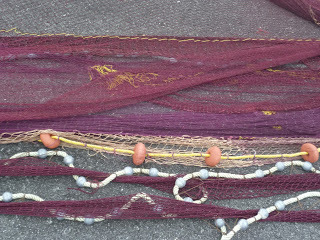
For the last couple of days, a mastoras or craftsman has been on the island helping the fishermen to mend their nets. Early this morning, I went down to Livadia to watch him at work.

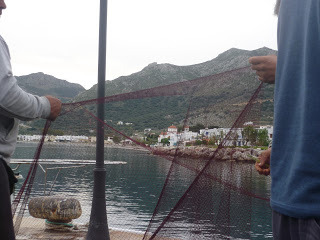



It was likely to take all day, so Lisa the pup and I went for a walk around the harbour.

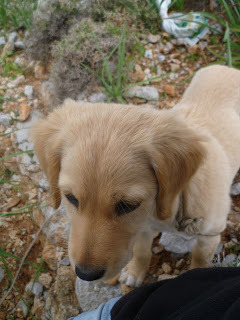
In the small harbour on the other side of the bay, they were rubbing bundles of freshly-caught octopus on the ground, to ready them for eating.


We continued up the hill and found lots of kiklamena, wild cyclamen.
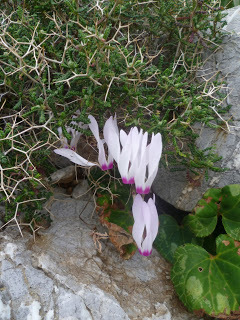
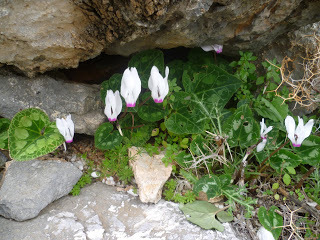
When we got back to the main harbour, the cats had gathered around the fishing boat as Stelios was cleaning dog fish, or small sharks. Where there are dog fish being cleaned, there are cats, and where there are cats there are dogs...

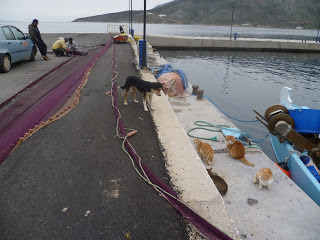
The mending of the nets continued...
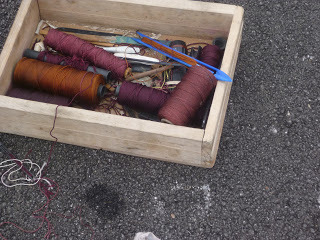

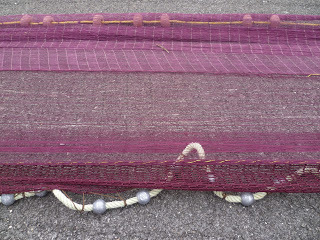
... but we had to say goodbye

Published on February 21, 2013 04:09
February 11, 2013
L is for Learning (and Lisa the Labrador)
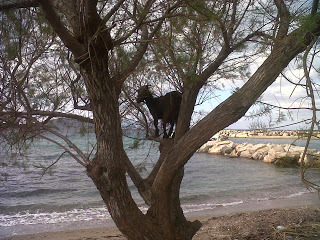
First, to share something I found this morning. No, I don't mean that goat up a tree - that was another day. Something else.
A company called GoLearnTo.com sent out a press release saying that learning holidays are the real way to switch off from work by absorbing yourself in learning a new skill. Fair enough, I thought, but I'd looked into the prices of cooking schools not long ago and the UK ones I found were astronomical.
Well, not with this company, or so it seems - not in Greece, anyhow. How about three days on the Greek island of Poros, accommodation included, with a day's Greek cookery lessons for £199? Or a week of yoga and horse riding (hopefully not at the same time) in Kalamata for £895. Or a week of private Greek language lessons for £692. I might look into it... Here's the link to activity holidays in Greece:
http://www.golearnto.com/search.aspx?ctry=89&rgn=&activetype=&datefrom=&dateto=&page=1

There again, in terms of Greek cooking, I am feeling rather pleased with myself. Stelios came home last night with some freshly caught galeos (dogfish/small shark) which someone had given him, and was just coating it in flour to fry in olive oil when he mentioned it's good with skordalia, garlic sauce. I got to work.
Luckily we now have a box of earthy potatoes that we dug up from the field, so I cleaned and quartered them and set them to boil. When they were soft, I mashed them up. I pounded a few garlic cloves in the pestle and mortar (OK, I couldn't find the mortar or bowl, so used a Greek coffee pot or briki instead). I mixed up the two with some vinegar, pepper and olive oil. We tasted it.
'Does it need anything else?' I asked.
'Eh, more olive oil?' Surprise, surprise.
Eh voila. Or should I say 'oriste'.

Stelios had arrived home with the fish just as I was trying to make bread. My last effort didn't work out very well, so I took advantage of the fact that we have borrowed some new fish-weighing scales from Nikos, and thought I'd follow the bread recipe in my new Food for Thought cookbook, bought by my mum when we went for lunch at the mouth-watering vegetarian eatery in Covent Garden.
What with the fisherman arriving home mid-knead, and a puppy diving around the kitchen, it was rather distracting, but it turned out nice bread, light on the inside and crusty on the outside, if it did fall rather flat. Judging by the chunk missing already, it won't last long. In fact, given that there is now pork roasting in the oven with garlic, lemon, oregano and olive oil - and of course potatoes - it may come in handy to mop up lemonato juice.
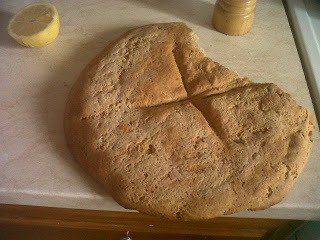
What? Oh, yes, so... I did say puppy. Ahem. Here she is.

Which is the real reason this post is all about learning. Those activity holiday people got it right: an absorbing activity is definitely the way to switch off from everything else.
It began, naturally, with a trip to Rhodes to fix the car. (Although of course it started before that; some may say I was weakening when I arrived back in Tilos in January and spent the first half hour playing with that lovely floppy-eared dog...) Stelios was waiting to talk to the car electrologos about the fault that had left the battery dead, and since my vocabulary doesn't quite stretch to that even in English, I went for a wander, and the only other shop in the vicinity turned out to be a pet shop.
The tiny, scared pup was in a cage on her own, the only dog in a shop of parrots, budgies, lizards and snakes. Her brown eyes were calling to me and I opened the cage to stroke her soft fur. And I walked out again, and it all could have ended right there. To paraphrase Jack Nicholson in Terms of Endearment, I was just inches from a clean getaway.

But as I strolled back to the car, the pet shop owner came after me to say they were looking to give her away to a good home because her mother's owner couldn't keep her.
Ah.
Well, a long story could ensue but suffice it to say, I anticipated a mere fraction of the challenges involved in learning to care for and train a puppy. I've learned the words gavgizei (she barks), dagonei (she bites), gleifei (she licks). There is never a dull moment.
You will need:
An endless supply of cardboard boxes (ours all happen to be modem boxes from burnt-out modems thanks to winter storms, and these are perfect because of their many compartments), kitchen roll holders, brooms, fishing nets, and a vivid imagination to to turn anything else you find lying around into a toy
Patience. Lots of patience
The ability to move faster than a puppy
Not much sleep
Thick skin
The ability to collapse in hysterics when your puppy does a meerkat impersonation, or digs holes in the sand on the beach and falls into them, or pretends she's not really biting the vacuum cleaner wires but her toy which just happens to be right next to the vacuum cleaner
An appreciation of the beauty of watching an Andrex puppy bound through a green meadow full of daisies

'Afto megalonei?' is something you will hear from local Greek people - will it get bigger? Most people then look at her feet and say they can tell how big she will get from the size of her feet. Having big feet myself, I feel this is a little insensitive.
'Einai bez?' No, she's not beige. At this point you get defensive and turn all Farrow and Ball. Buttermilk, pale caramel, straw - but don't call my puppy beige.
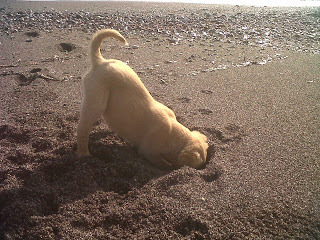
'Thilika?' is the next question - female? Followed by the forecast that she'll be making babies. We have firm plans to stop that idea in its tracks, although local wisdom seems to say that she must give birth once before we neuter her, which is odd. Anyway, it's a little early, she's only two months. There again...
I took her down to Livadia a couple of nights ago, and thought I'd introduce her to my pal the floppy-eared cat-chasing dog I met in January. Well, they got on all right, even though he suddenly looked big enough to eat little Lisa in two mouthfuls. But the problem is... they got on rather too well, pawing one another delicately and whispering sweet nothings into one another's ears (well, behinds). When I swept Lisa up into my arms and took her into Petrino Cafe, feeling I'd had enough of playing gooseberry, the big floppy-eared dog made sad eyes from the doorway.



Today is another day of wind, occasional showers, and bright warm sunshine. The island is so green, with flowers everywhere - blue, purple, white, mauve, yellow - and almond blossom too. The first shoots are appearing on the orange and pomegranate trees we planted before Christmas. The editor of the American edition of Falling in Honey has come up with a new subtitle for the book: How a Tiny Greek Island Stole My Heart. Sums it up nicely.
Published on February 11, 2013 03:54
Turning a Blog of Your Incredible Journey into a Book? Some Tips...
I was recently approached by an author who had done an amazing trip with a friend, and was in the process of turning his blogs about the experience into a book. He wanted some advice - and it occurred to me some tips might be useful to others:
It’s sometimes difficult to know how to develop diaries and blog entries into a full-length book. First, read a few books of adventurous journeys and think about what appeals to you. Bear in mind is that the world of publishing moves slowly; we have to ‘sell in’ a book to the trade six months before publication, and the book retailers don’t like to take travel books during the 'Christmas' period between September and February. And you want that book to stay on the shelves for a good few years too. So avoid too many dates and events that will make the book feel dated. Try to make it a timeless story – one that will still inspire 5 years from now. That means you don’t have to rush it, although obviously it would be good to get the book out there before your followers have forgotten what you did… Think about whether a traditional publisher is right for you, if you need to get the book out quickly.Make sure it’s a great story. You’ve probably got loads of material. Trim the stuff we don’t really need to know. An ideal length for a book like this is 80,000 words. Develop your best anecdotes into scenes with dialogue and description, so we feel we are there with you on the road. Let us feel we are on the journey with you. But a real journey has plenty of boring bits, and they don’t make for good reading (do we really need to go through the experience of visa applications with you?). Get us on the road with you as soon as you can, then tell the bits about setting up the journey in flashback perhaps. Though do include some of the difficult times – the highs and the lows – and if one of the lows is boredom, it’s fine to show that. Good characters are essential – the main characters are you and whoever you went on the journey with (if anyone), so make sure we get a good sense of you. If you did the trip with someone else, we'll need to know if that other person is thinking of writing a competing book - not a good idea! Ideally, if you're both interested in writing a book, you'll want to be working together to maximise potential.Adventure stories are great, but we also want to understand why you’re doing this journey. It's an interesting measure of our times that people are doing extraordinary journeys all the time. We get dozens of proposals from people who've cycled the world, or walked around Britain. So there has to be a reason why people will want to read your story, what makes it special and inspiring – and you have to tell it in a compelling way. No pressure, eh?!If you're thinking of sending to Summersdale, I'd like to see a proposal and two sample chapters, ideally the first two. Let me know what plans you have for the future. And good luck with it.
It’s sometimes difficult to know how to develop diaries and blog entries into a full-length book. First, read a few books of adventurous journeys and think about what appeals to you. Bear in mind is that the world of publishing moves slowly; we have to ‘sell in’ a book to the trade six months before publication, and the book retailers don’t like to take travel books during the 'Christmas' period between September and February. And you want that book to stay on the shelves for a good few years too. So avoid too many dates and events that will make the book feel dated. Try to make it a timeless story – one that will still inspire 5 years from now. That means you don’t have to rush it, although obviously it would be good to get the book out there before your followers have forgotten what you did… Think about whether a traditional publisher is right for you, if you need to get the book out quickly.Make sure it’s a great story. You’ve probably got loads of material. Trim the stuff we don’t really need to know. An ideal length for a book like this is 80,000 words. Develop your best anecdotes into scenes with dialogue and description, so we feel we are there with you on the road. Let us feel we are on the journey with you. But a real journey has plenty of boring bits, and they don’t make for good reading (do we really need to go through the experience of visa applications with you?). Get us on the road with you as soon as you can, then tell the bits about setting up the journey in flashback perhaps. Though do include some of the difficult times – the highs and the lows – and if one of the lows is boredom, it’s fine to show that. Good characters are essential – the main characters are you and whoever you went on the journey with (if anyone), so make sure we get a good sense of you. If you did the trip with someone else, we'll need to know if that other person is thinking of writing a competing book - not a good idea! Ideally, if you're both interested in writing a book, you'll want to be working together to maximise potential.Adventure stories are great, but we also want to understand why you’re doing this journey. It's an interesting measure of our times that people are doing extraordinary journeys all the time. We get dozens of proposals from people who've cycled the world, or walked around Britain. So there has to be a reason why people will want to read your story, what makes it special and inspiring – and you have to tell it in a compelling way. No pressure, eh?!If you're thinking of sending to Summersdale, I'd like to see a proposal and two sample chapters, ideally the first two. Let me know what plans you have for the future. And good luck with it.
Published on February 11, 2013 01:09
January 27, 2013
ALONE IN ANTARCTICA
In January last year, as some of you may remember, 34-year-old British woman Felicity Aston – whose first 'expedition' involved being bribed up Helvellyn in the rain at the age of nine with a packet of Opal Fruits – completed her solo crossing of the Antarctic. Her honest tweets from the incredible journey were followed by ten thousand people on Twitter.
I’m excited to announce that this summer Summersdale will be publishing Felicity’s book about the journey – the emotional and psychological journey, as well as the physical one.
What would it feel like to be out there alone in such vast emptiness? I think a lot of people want to know how it would feel to be isolated like that, and what drives a person to do such a thing.
Only three people in the world have crossed Antarctica alone. The first two were men and both Norwegian. Just to go one better, Felicity didn’t use kites or parasails to assist her. Past expeditions had pushed her but she didn’t feel she had found her limits. Her achievement featured in more than 250 national newspapers around the globe, on countless radio and TV broadcasts.
The people who followed her on Twitter and the more than 130,000 people who listened to her ‘phonecasts’ over the 59-day journey responded to her openness and humour – the frustration of hallucinating the smell of freshly baked bread, and the difficulty of doing laundry at -40ºC, as well as the solitude and the difficulty keeping going. Felicity brings a fresh voice to Antarctic exploration for a new generation.
Felicity Aston has spent over a decade travelling, working and living all over the Polar Regions; she led the first British women’s team to cross Greenland, and in 2009 led the most international team of women ever to ski to the South Pole, the subject of her first book, Call of the White, a finalist in the Banff Mountain Book Competition in 2011.
Published on January 27, 2013 09:00
January 21, 2013
Dogs and Cats and a Tiny Greek Island

If anyone has a dog EXACTLY like this one that they don't want any more, please could you let me know?
This is the new friend I made on arriving back in Tilos on Sunday lunchtime, after an overnight ferry from Athens.
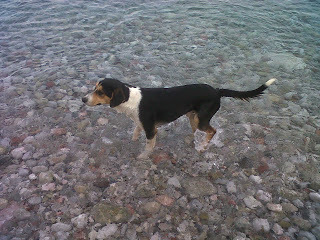
He likes the sea (well, just look at that clear water)...

Isn't sure if he likes cats...

Well, maybe...



Butter wouldn't melt... This was just before he ran in circles around the cat, which eventually decided to run for it and only just got away...
But hang on, what's this...

...staying RIGHT HERE out of reach
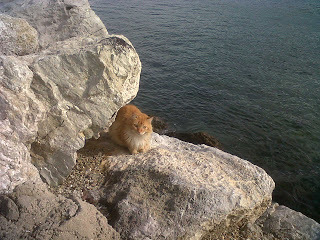
...aha!
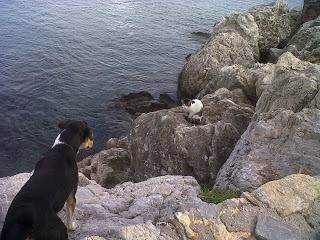
There must be a way down!

When all the cats have been chased, a stick is the answer. OK, this might not be the biggest stick...
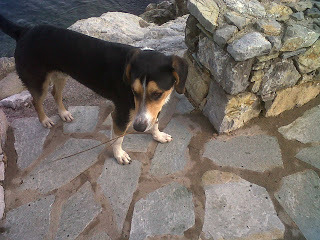
...but still, a stick's a stick...

...and this one's mine.
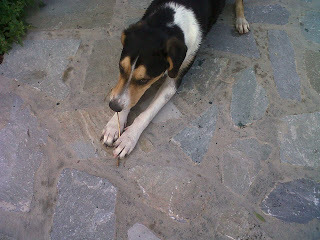
And so I chased a dog around the harbour for a while. Welcome back to Tilos!

While I was away, people kept asking me, 'Why did you end up in Tilos?' It's a hard question to answer. But on Sunday, arriving back here, it dawned on me that it's simple: it's just the most beautiful place I've ever been.
Published on January 21, 2013 22:24
January 10, 2013
Travelling to Greece: Two Books about Difficult Journeys
I recently found To Hellas and Back by Lana Penrose, and have been chuckling my way through the book.
Whereas my upcoming book Falling in Honey is about my dream of living on a Greek island and how I found my way there, Lana's story is what happens when you have absolutely no desire to go to Greece and are dragged to the suburbs of Athens by your partner all the way from Australia. He speaks Greek and she doesn't.
In clever prose she paints a vivid picture of daily struggles with life in a place where the basics are utterly confusing. I've just reached the point in the story where she is beginning to find her feet, and can't wait to see what happens. Check out Lana's work here:
http://lanapenrose.com.au/
In the meantime, I've been reading a very, very different story of a journey through Greece by John Mole, author of It's All Greek to Me! http://www.johnmole.com/
His new book is called The Sultan's Organ, and it's extraordinary: the 1599 diary of young Thomas Hallam, organ-builder, who journeyed by ship from London to Constantinople to accompany a sixteen-foot high jewel-encrusted self-playing organ that was being sent as a gift from Queen Elizabeth to the Sultan of Turkey. John Mole has put the diary into modern English and it's a fascinating true story.
My Greek partner Stelios was intrigued when I started telling him details of their circuitous route -- it takes them weeks just to leave the shores of England because of pirate attacks, the fact that they were at war with Spain, and bad weather -- and wished it was available in Greek too. Hallam gives the first account of a foreigner's overland crossing of mainland Greece, and he has some amusing encounters with the people. It's worth reading for that alone.
The UK edition of my book, Falling in Honey, is due out in March in paperback, and will also be released as an audiobook, which is very exciting. John Mole, as described above, has offered a lovely endorsement for the back cover:
'If you can't escape to an idyllic Greek island, Falling in Honey is the next best thing'
John Mole
Whereas my upcoming book Falling in Honey is about my dream of living on a Greek island and how I found my way there, Lana's story is what happens when you have absolutely no desire to go to Greece and are dragged to the suburbs of Athens by your partner all the way from Australia. He speaks Greek and she doesn't.
In clever prose she paints a vivid picture of daily struggles with life in a place where the basics are utterly confusing. I've just reached the point in the story where she is beginning to find her feet, and can't wait to see what happens. Check out Lana's work here:
http://lanapenrose.com.au/
In the meantime, I've been reading a very, very different story of a journey through Greece by John Mole, author of It's All Greek to Me! http://www.johnmole.com/
His new book is called The Sultan's Organ, and it's extraordinary: the 1599 diary of young Thomas Hallam, organ-builder, who journeyed by ship from London to Constantinople to accompany a sixteen-foot high jewel-encrusted self-playing organ that was being sent as a gift from Queen Elizabeth to the Sultan of Turkey. John Mole has put the diary into modern English and it's a fascinating true story.
My Greek partner Stelios was intrigued when I started telling him details of their circuitous route -- it takes them weeks just to leave the shores of England because of pirate attacks, the fact that they were at war with Spain, and bad weather -- and wished it was available in Greek too. Hallam gives the first account of a foreigner's overland crossing of mainland Greece, and he has some amusing encounters with the people. It's worth reading for that alone.
The UK edition of my book, Falling in Honey, is due out in March in paperback, and will also be released as an audiobook, which is very exciting. John Mole, as described above, has offered a lovely endorsement for the back cover:
'If you can't escape to an idyllic Greek island, Falling in Honey is the next best thing'
John Mole
Published on January 10, 2013 00:28
January 1, 2013
Octopus a la Provencale

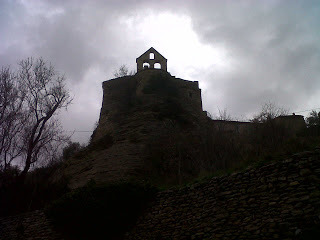 We have now spent almost a week in Provence, where my head has been getting very confused with trying to translate French into Greek and vice versa, resulting in a melange of the two that leaves everyone baffled and me hitting my forehead in despair.
We have now spent almost a week in Provence, where my head has been getting very confused with trying to translate French into Greek and vice versa, resulting in a melange of the two that leaves everyone baffled and me hitting my forehead in despair.
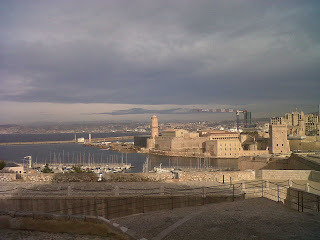
In Marseille (the oldest city in France, founded by the Greeks 2,600 years ago) we ate couscous in a Tunisian restaurant, ogled fish stalls and African fruits and noticed that bakeries sell newspapers alongside croissants so that Marseille folk can arrive for their morning coffee fully equipped.

We ate a hot chicken-and-almond filo pie from a North African market stall, and Tunisian sweets made with thin pastry and almonds, and listened to North African music in a bar where most of the guys were drinking coffee rather than beer and used empty juice bottles as illegal ashtrays. After coming from England, we felt like we’d almost arrived back in Greece, in a place where smoking and coffee drinking are taken seriously, and everyone has jet black hair and wears a black leather jacket. And in fact, we almost arrived back in Tilos: we stumbled upon a Greek café called Kalipita and I dragged Tilos Man inside so he could do the talking for a while as we drank a glass of his favourite Greek wine, Nemea, and the video screen showed a cruise from Rhodes to Symi…

In Isle sur la Sorgue, we ate local olives and tapenade and honey, ultra-thin pizza with artichoke, fillet of trout, duck breast and, at Café de France, a risotto made with foie gras and truffle shavings for lunch on New Year’s Eve, accompanied by heavenly white wine. But we have learnt that Tilos Man, while he enjoys all of this, finds that Greek cuisine is still sufficient to live on. We have also learnt that according to him, French yoghurt is completely tasteless; I tried in vain to find, in a whole supermarket aisle of finicky French fat-free faiselles and fromage blancs, anything that resembled a thick Greek yoghurt – except, of course, for all the ones that were actually labelled Greek yoghurt. The French oranges, which were actually from Spain, were also tasteless (after eating Tilos oranges straight from the trees down the road, I’m forced to agree).
 We have learnt that many of the trees in Provence are the same as in Tilos – pefka, elata and kiparissia, olives and oaks and calamia or bamboo canes. Stelios has spotted tiny weeds and grasses that Provence also shares with Tilos, such as radikia, and he stared at a grassy verge for some time today before asking in confusion where the sparagia or wild asparagus was – since so many plants are the same, there should be sparagia.
We have learnt that many of the trees in Provence are the same as in Tilos – pefka, elata and kiparissia, olives and oaks and calamia or bamboo canes. Stelios has spotted tiny weeds and grasses that Provence also shares with Tilos, such as radikia, and he stared at a grassy verge for some time today before asking in confusion where the sparagia or wild asparagus was – since so many plants are the same, there should be sparagia.
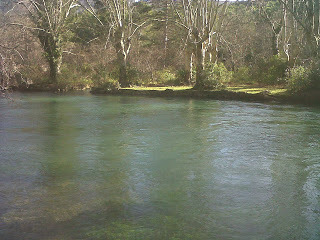
We have walked in the sunshine almost every day, and often saw the snow on top of Mont Ventoux, against a deep blue sky; while back in Tilos, according to daily phone calls from Megalo Horio, the rain it rained every day. Once we walked along the crystal clear river at Fontaine de Vaucluse, where it rises from a spring of unknown depths into a still pool below tall cliffs, before gushing powerfully into white water over boulders, and eventually calming into a fast-moving river below the remains of a medieval castle. And there we found ‘the best kantina in France’, Snack The Big Fred, where we sat in the sunshine and ate an excellent salad and fish with cracked wheat, and a crepe with Nutella, and our own Kantina Man had his photo taken with Monsieur Fred.
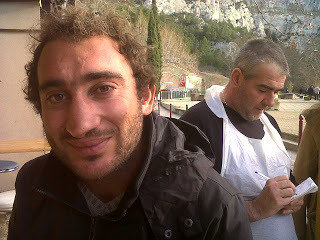

And after a long day of mixing up my words, there was always rosé, and a sunset.

Published on January 01, 2013 10:34
November 29, 2012
Autumn Celebrations
It’s still dark and I can hear Stelios on the phone to Nikos as they arrange where they’re meeting for fishing.‘No, I can’t take the car, Jennifer needs it…’I’m puzzled (do I need the car?) and mumble from bed, ‘I don’t need the car…’A few minutes later he’s upstairs.‘Moraki mou, could you do me a little favour…?’ And I learn why I need the car. Which is why I was driving to the post office in Livadia just after eight yesterday morning, and saw the centre of the island looking breathtakingly beautiful. The early ygrasia, the moisture in the air, had coated the grass and turned it all silvery-white in the sunshine, and the trees darker than usual so their reddish-brown autumn leaves glistened.When I arrived, the post office man was standing out in the square watching the junior school kids gathering for a school outing (Yeia sas Kyria Jennifer!!). Surprise surprise, there was no queue to get Stelios’ money transfer done.So I walked down to the rocks, where the water was glassy calm, and went for a swim as far as the rock stack, where I got close to a cormorant. The water was clear enough to see the fish down below, and the only sound was a fishing boat chugging across the bay. A few guys were fishing off the quay, and the morning light was still hazy. Fabulous.
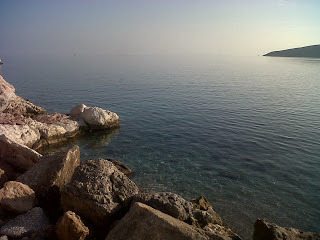
Stelios and I have been celebrating this week – my birthday, and his name-day or yorti, which is more important than a birthday in Greece. ‘Don’t you have a name day?’ asked Stelios. ‘No, we don’t do that,’ I said. ‘I don’t think there is a Saint Jennifer anyway.’Eleftheria explained to me it’s easier to remember someone’s saint’s day than their birthday, and I suddenly realised what a good idea it is after all.Life on Tilos takes away any commercialisation of birthdays too. I quickly ruled out the idea of finding him a gift in any of the shops here, and since I’d bought him a book last week on the ferry back from Rhodes anyway, I made him chocolate brownies instead. They were supposed to be chocolate lava cakes but the measurements were a bit tricky. He said it would be similarly difficult to get anything for me, so he bought some fresh fish from another fisherman, some balades, and even cleaned them ready for cooking (and cleaned the kitchen afterwards!). They’re not the prettiest fish with those huge eyes, which apparently they need for seeing at over 200 metres deep, but they’re tasty.
‘Oh, I forgot, I got this for you when I went to the shop, moraki mou!’ A Kit-Kat emerges from the pocket of the holey fisherman’s pants. ‘How long’s it been there?’ It looked like it had been there a while. But it's always the thought that counts.Fish, wine, salad, chocolate… we don’t need to go out for dinner. Which is just as well because at this time of year, there's not very much choice in Tilos.I admit, I had a delightful time in Rhodes last week: being able to go out to cafes like Casa la Femme in the evening and listen to music and the buzz of chatter; being able to pick up a sandwich or have a salad made for me at Eatery whenever I want. I had a massage (too much digging in the field) and went to a yoga class run by a lovely woman I met at the kantina this summer. I even – finally – found time to look around the modern art museum, where I enjoyed the playful portraits of soldiers with moustaches by Theofilos, and the modern icons by Spyros Vasileou, and his lovely painting of ‘Supper on the First Day of Lent 1950’. And then I got talking to the curator, Takis, and he read me his poetry…
I could have stayed for longer. I came back laden with goodies – a reading lamp, a casserole dish, a tasty cheese covered in black peppercorns, a jar of strange pickled leaves. But of course I was instantly reminded of how magical Tilos is. I drove down to Greek Dance class, had so much fun and when I drove back the hills were bathed in silver moonlight. And wherever I walk, the fields are being readied for planting new crops, people shout hello, and the olives are being harvested (and we have a promise of some fresh olive oil soon!). And when I go for a walk, the startled goats and cats make me laugh out loud.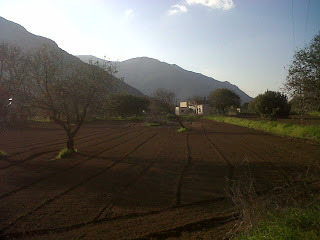
If you ever wondered what noises farm animals (and tractors) make in Greece, you have to see this video 'To Poulaki Tsiou' that’s been doing the rounds over here: http://www.youtube.com/watch?v=RcuY9CtYPKs

Stelios and I have been celebrating this week – my birthday, and his name-day or yorti, which is more important than a birthday in Greece. ‘Don’t you have a name day?’ asked Stelios. ‘No, we don’t do that,’ I said. ‘I don’t think there is a Saint Jennifer anyway.’Eleftheria explained to me it’s easier to remember someone’s saint’s day than their birthday, and I suddenly realised what a good idea it is after all.Life on Tilos takes away any commercialisation of birthdays too. I quickly ruled out the idea of finding him a gift in any of the shops here, and since I’d bought him a book last week on the ferry back from Rhodes anyway, I made him chocolate brownies instead. They were supposed to be chocolate lava cakes but the measurements were a bit tricky. He said it would be similarly difficult to get anything for me, so he bought some fresh fish from another fisherman, some balades, and even cleaned them ready for cooking (and cleaned the kitchen afterwards!). They’re not the prettiest fish with those huge eyes, which apparently they need for seeing at over 200 metres deep, but they’re tasty.

‘Oh, I forgot, I got this for you when I went to the shop, moraki mou!’ A Kit-Kat emerges from the pocket of the holey fisherman’s pants. ‘How long’s it been there?’ It looked like it had been there a while. But it's always the thought that counts.Fish, wine, salad, chocolate… we don’t need to go out for dinner. Which is just as well because at this time of year, there's not very much choice in Tilos.I admit, I had a delightful time in Rhodes last week: being able to go out to cafes like Casa la Femme in the evening and listen to music and the buzz of chatter; being able to pick up a sandwich or have a salad made for me at Eatery whenever I want. I had a massage (too much digging in the field) and went to a yoga class run by a lovely woman I met at the kantina this summer. I even – finally – found time to look around the modern art museum, where I enjoyed the playful portraits of soldiers with moustaches by Theofilos, and the modern icons by Spyros Vasileou, and his lovely painting of ‘Supper on the First Day of Lent 1950’. And then I got talking to the curator, Takis, and he read me his poetry…

I could have stayed for longer. I came back laden with goodies – a reading lamp, a casserole dish, a tasty cheese covered in black peppercorns, a jar of strange pickled leaves. But of course I was instantly reminded of how magical Tilos is. I drove down to Greek Dance class, had so much fun and when I drove back the hills were bathed in silver moonlight. And wherever I walk, the fields are being readied for planting new crops, people shout hello, and the olives are being harvested (and we have a promise of some fresh olive oil soon!). And when I go for a walk, the startled goats and cats make me laugh out loud.

If you ever wondered what noises farm animals (and tractors) make in Greece, you have to see this video 'To Poulaki Tsiou' that’s been doing the rounds over here: http://www.youtube.com/watch?v=RcuY9CtYPKs

Published on November 29, 2012 08:08
November 13, 2012
The birds and the bees, all over again. And the crocodiles.
Got chatting to Pavlos today, as I was getting out of the car - he happened to notice that I was getting out of the passenger door even though I'd been driving. The driver door doesn't open any more, see. Well, I reckon that car has done pretty well, considering the rally driving it's subjected to, bumping along that dirt track through dust-clouds and over rocks and ruts... not to mention all the rabbit-killing. Anyway.
We discussed his passion fruit trees for a while, and when he cut one of the fruit open to show me, we got on to the subject of pomegranates. The mice ate all his pomegranates this year, he said. They run up the trees. He said he pulled down a branch to pick some fruit and a mouse ran out. Don't the eagles eat the mice, I asked? But no, said Pavlos, he'd never seen a bird go for a mouse.
Then I asked him where the bees were. Turns out they are all on holiday in Rhodes. This time of year, there's not much for them to eat here in Tilos so they go to Rhodes, for what sounds like an extended gourmet break.
The bees don't worry about mice, but apparently the 'little crocodiles' - a local name for the big lizards or savres - get them. The lizards sit outside the hive and close their eyes - they have a thick skin that's impervious to stinging, so it's only their eyes that are sensitive - and eat the bees as they come out of the hive.
Sometimes I'm so pleased that I'm understanding all this in Greek that I miss the obvious. Was Pavlos having a laugh - was he winding me up? You never can tell with Pavlos.

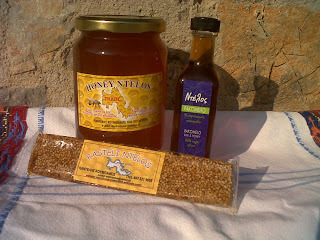
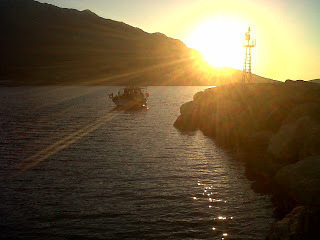
We discussed his passion fruit trees for a while, and when he cut one of the fruit open to show me, we got on to the subject of pomegranates. The mice ate all his pomegranates this year, he said. They run up the trees. He said he pulled down a branch to pick some fruit and a mouse ran out. Don't the eagles eat the mice, I asked? But no, said Pavlos, he'd never seen a bird go for a mouse.
Then I asked him where the bees were. Turns out they are all on holiday in Rhodes. This time of year, there's not much for them to eat here in Tilos so they go to Rhodes, for what sounds like an extended gourmet break.
The bees don't worry about mice, but apparently the 'little crocodiles' - a local name for the big lizards or savres - get them. The lizards sit outside the hive and close their eyes - they have a thick skin that's impervious to stinging, so it's only their eyes that are sensitive - and eat the bees as they come out of the hive.
Sometimes I'm so pleased that I'm understanding all this in Greek that I miss the obvious. Was Pavlos having a laugh - was he winding me up? You never can tell with Pavlos.



Published on November 13, 2012 11:07



